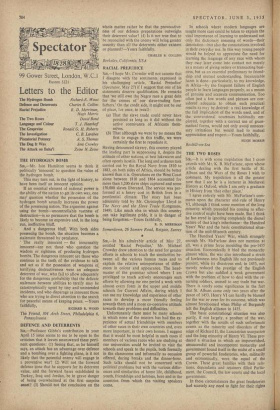RACIAL PREJUDICE
SIR,-1 hope Mr. Crowder will not assume that I disagree with the sentiments expressed in his challenging article, 'Racial Prejudice' (Spectator, May 27) if I suggest that one of his statements deserve qualification. He remarks that 'we still owe the Negro race a great debt for the crimes of our slave-trading fore- fathers.' On the credit side, it might not be out of place, for once, to recall :
(a) That the slave trade could never have persisted as long as it did without the active connivance of Africans them- selves.
(b) That although we were by no means the first to engage in this traffic, we were certainly the first to repudiate it.
Having denounced slavery, this country played the leading part in suppressing it, despite the attitude of other nations, at best lukewarm and often openly hostile. The long and arduous task carried out by the Royal Navy from 1810 to 1883, on both sides of Africa, should be better known than it is. Operations on the West Coast alone between 1810 and 1864 accounted for more than 1,200 slave ships captured and some 150,000 slaves liberated. The service was per- formed at a heavy cost in British lives in a pestilential climate. The story has been admirably told by Mr. Christopher Lloyd in The Navy and the Slave Trade (Longmans, 1949). Like much else in which this country can take legitimate pride, it is in danger of being forgotten.—Yours faithfully,
R. D. MERRIMAN
Somerdown, 26 Somers Road, Reigate, Surrey


































 Previous page
Previous page